Whew.
This stuff is insufferable and yet suffer it many of us do, in silence. But blame our oversensitive personality types all you like: this sort of thing raises our hackles and is likely the main reason we have a blog. Because now we have a space where we can refute such nonsense in long form rather than raging into the void.
And sure, writing a really long blog post about how much we hate lazy criticism of Disney is probably the same thing as raging into the void, but we’re going to do it anyway.
Shall we begin?
Lazy Opinion #1: Disney Princesses are BAD ROLE MODELS because they all want nothing more than to “land princes”
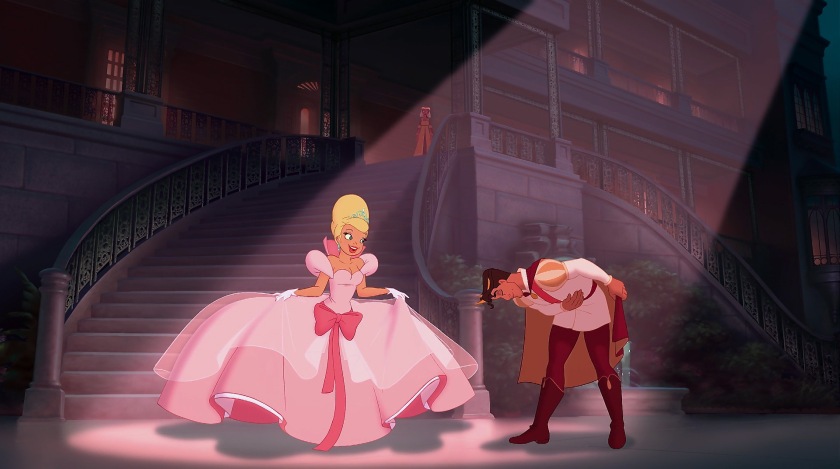
“I’ve often wondered why the mothers are always dead in the Disney Princess stories. I figure it’s that if the mom was alive and well, the writers would miss all sorts of plot opportunities starring the vicious, evil stepmother. I’ve also questioned whether Disney would ever get a clue and give little girls a royal role model whose singular goal in life wasn’t to land the handsome prince.”
– some internet page seemingly about the newest Disney Princess who is in fact just from a new TV show (Sofia the First) which was coming out soon at the time.
a) BAD ROLE MODELS: Please stop requiring every female character ever to be a role model. It’s not fair. When we do this, then Merida is a horrible character because she does selfish things and doesn’t accept responsibility until like the last second. And Elsa is a horrible character because she can’t figure out her own abilities. Characters, male, female, and everyone besides should just be characters. They should be flawed and should be allowed to make mistakes, and if the audience learns from them that’s great. We don’t need stone-hearted perfection standing on pedestals to look up to. Stop it.
b) The mothers are not always dead in Disney Princess stories. See Princess and the Frog, Tangled, Mulan, and Brave (Brave admittedly came out after this article and is also a Pixar movie, but we included it for completeness).
c) Princesses with dead (or absent) mothers and no evil stepmother in sight: Aurora, Eilonwy, Ariel, Belle, Jasmine, Pocahontas, Kida, Giselle, Anna, Elsa. It really is just Snow White, Cinderella, and Rapunzel.
d) It might also be helpful to wonder why so many heroes of fiction are orphans: IT’S MORE FUN WITH NO PARENTS. BECAUSE IT’S FICTION.
Now let’s have the ladies have their say.
Snow White: OK, Sofia the First clickbait has a point with her. Her first song is about wishing for love, and then her main song is literally called “Some Day My Prince Will Come.” But we’d like to give Disney a pass here. This was the first animated feature EVER, let alone the first animated fairy tale. Can we really blame them for going fully into the “fairy tale fantasy romance (with a man prince) is the be all and end all of the female experience” thing? In 1938?
Cinderella: She doesn’t even know the guy is the prince at first. And when she finds out, she simultaneously finds out that he’s also looking for her, to marry her. Can we blame her for wanting to seize this opportunity, after watching 60 minutes of what her life is like with her stepfamily? CAN WE? We need to contextualize this stuff, man.
Aurora: She REALLY doesn’t know the guy is A HUGE IRREDEMABLE DOUCHEBAG the prince. And then she gets really upset when her fairy step mothers are like, “You’re going home! To marry the prince! Yeeeeey!” Yes, it’s still a “romance is the be all and end all” character arc but we’ve removed the “I need a prince to be happy” element that wasn’t even really ever there to begin with.
INTERLUDE OF INTERLUDINESS
Why, though, is the “I need a prince to be happy” element not really present, like, at all? Unless we’re talking Charlotte La Bouff?
Because romance conventions.
Ever since Pride and Prejudice (and, quite frankly, well before that also) we like our lady protagonists to not be gold diggers. We instead like them to be a little like Cinderella: secret nobility living lives of virtuous peasant sufferers who are domestic and motherly (see: the mice) who are magically sought out by the prince (or rich dudes more like Darcy) because they immediately see the merits and true, hidden nobility of our lady. This doesn’t exactly fit every romance, but it’s pretty much at the heart of most of them.
For example: Julia Roberts tearing up at the opera despite being an uncultured sex worker in Pretty Woman. Because she has nobility of soul, of course, and only rich dude Richard Gere can see it, and he will save her from her unfair life of not being materially wealthy. (ps: erm hates this movie and three hasn’t seen it and shouldn’t bother in erm’s opinion.)
So no, they’re not trying to land a prince, because that would ruin the fantasy of the girl who’s perfect in every way getting the prince even though she’s not after him, because she 110% deserves him, because she isn’t after him.
Like that One Direction song: “You don’t know you’re beautiful… that’s what makes you beautiful!”
If this article talked about how Disney Princesses have no discernible ambition (esp. the early ones), then we could tango.
But no.
INTERLUDY INTERLUDE OVER
Ariel: She wishes she were human. She daydreams about Eric somehow finding her under all of that ocean she lives in and asking her to run away with him. She gets hoodwinked into pursuing him so that she can stay human forever, with her voice as the expense. Discernible ambition? Not really. She’s sixteen, though, it’s OK. It’s also OK for her to have a major crush and make mistakes. We’ll talk about that in a minute. The point is, she’s not trying to land a prince. She’s trying to not become one of Ursula’s lovely garden gnomes.
Belle: The point of her is that she’s not like the Bimbettes who drool over Gaston. And she has to learn to like, and then love, the Beast, who isn’t like any conventional prince we kn0w.
Jasmine: The first Disney Princess with discernible ambition! She wants to “get rid” of Jafar. And to not marry some stuck-up prince. Which is probably why she ends up with Aladdin, who is a street rat.
And this is the part where we don’t need to explain anything anymore.
Pocahontas: No.
Mulan: No.
Tiana: HA!
Rapunzel: Another girl who ends up with a street rat.
Elsa & Anna: Yeah.
Seriously though – writing a mere two years post-Princess and the Frog and you’re still going to say that all Disney Princesses want to land princes and nothing else? Stop.
Lazy Opinion #2: 7 Reasons I Never Want My Girls to Watch “The Little Mermaid”

We’ve talked extensively about this movie and all of our thoughts about why, in our opinion, it’s unfairly maligned. But this clickbait meant to infuriate us and we’re sufficiently infuriated so whatever, let’s do this.
Reason One: Ursula is scary (looking?)
There’s a Cracked.com video under this one that we’re not going to bother watching, particularly because we too think Ursula is scary. She’s a great villain. This is not thoughtful critique on why it’s not suitable for children, even for the author’s children specifically. Can we not sanitize children’s entertainment, please? The kids deserve good villains.
Reason Two: King Triton is a bad father
Yeah. The movie is about his bad parenting decision. It shows him regretting it immediately. It shows him facing the consequences and getting over himself, growing and changing as he should. Again. This is not critique. This is deliberately not paying attention.
Reason Three: Ariel makes rash decisions/gives up her voice + family for a guy she’s never met and has only seen once
A sticking point with us too. But we talked it out. Ariel is a kid, she’s experiencing powerful emotions and hormones, and she should be allowed to experiment with those things without being preyed upon by some random sea witch out to exploit her pure feelings for whirlpool vengeance.
After Frozen, we’re done getting mad at girls for falling in love right away. We don’t need them to get punished for it anymore thanks.
Anyway, Ariel knows how to pick ’em. Eric is awesome.
Reason Four: Ariel is very stupid for trading her voice for legs and she wants her daughters to be less stupid
Watching a movie is not going to damage anyone’s intelligence, so long as people THINK ABOUT WHAT THEY ARE WATCHING AND ENGAGE WITH IT. And this nonsense doesn’t count as either of those things.
Ariel is a kid and is allowed to make mistakes and Ursula shouldn’t be preying on her vulnerability because she is a grown-ass squid woman and should know better. Triton also should have gotten over himself and let Ariel be a human, with her voice and everything, right from the start, but then we wouldn’t have a movie.
Yawn.
Reason Five: The only thing that matters is your body.
God forbid there should be some sexual chemistry in a movie about a sixteen-year-old girl. Also considering that we like to think of TLM as a trans narrative these days, this particular point lets us get all self-righteously SJW rageful. Aw yeah. Bodies are important.
Reason Six: Eric dumps Ariel for Vanessa
… because Ursula magicked him to do so. It’s a movie. With a plot.
Reason Seven: There’s a happy ending
This point is particularly sticking because, and, like, can you even believe this: there’s a happy ending DESPITE the fact that Ariel “disobeyed” her father! You know, the father that’s the worst father ever, according to reason two.
But. OK. Once more, for the people in the back: IT’S OK THAT ARIEL MADE A MISTAKE AND ACTED RASHLY BECAUSE OF HER FEELINGS (BOTH THE FEELINGS FOR ERIC, AND, MORE IMPORTANTLY, THE FEELINGS STIRRED UP BY BEING ANGRILY REJECTED BY HER FATHER FOR BEING A HUMAN ENTHUSIAST) AND IT’S OK THAT SHE STILL ENDED UP HAPPY WITH A DECENT GUY AND A LOVING FAMILY SUPPORTING HER. WE DON’T NEED TO PUNISH GIRLS FOR HAVING FEELINGS AND MAKING MISTAKES.
And we especially don’t need to punish the girl when the story was more about a father, who is an adult and should know better, making the rather major mistake of not accepting that his daughter is his daughter and he can’t change her, or what kind of physical being she wants to be.
Let lazy criticism of The Little Mermaid burn in all the fires, we’re tired of it.
Lazy Opinion #3: All the Villains are Secretly Right
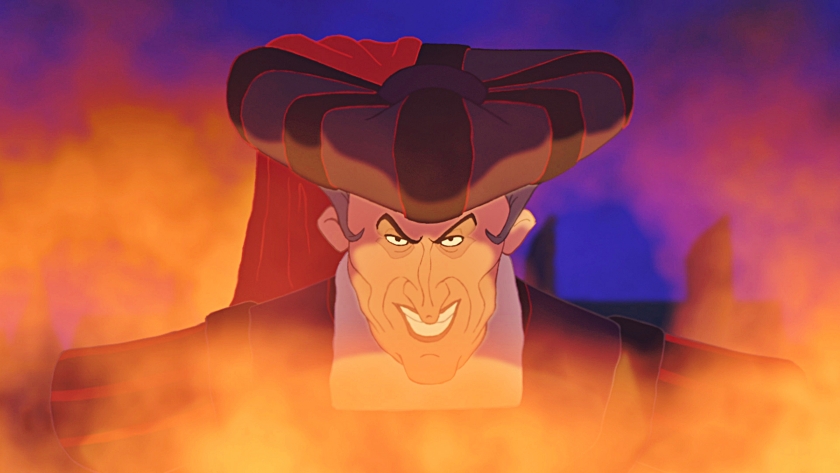
WATCH THE MOVIES ACTUALLY. AND THEN YOU WILL LEARN.
The laziness has infected us, so we’ll only refute a couple. Though we have already done this a bit.
Jafar: A Cracked.com video claims that he’s a “brilliant strategist” working for an incompetent boss. Yes, the Sultan is incompetent. No, Jafar isn’t a brilliant strategist. At different points, his plan was to:
- get a genie
- exploit Aladdin to get a genie
- kill Aladdin by
- knife/Cave of Wonders
- drowning
- magically throwing him far away (with magic carpet)
- marry Jasmine to become the Sultan even though she’s expressed a desire to banish and/or execute him
- enslave Jasmine and yet still offer marriage
- make magical wishes for:
- Sultanhood
- Powerfulest Sorcerorhood
- Geniehood
We should note that all of these plans fail spectacularly. SPECTACULARLY. The point of him is that he’s power-hungry, which is the opposite of brilliant, as it means Aladdin can easily outwit him into living in a teacup with a parrot for eternity.
The point is, you can’t argue that the man is actually right all along when it’s clear that he doesn’t even know what he wants to do with his life.
Hades: People like him because they see him as a brain vs brawn underdog when the dude is maybe slightly more intelligent than Jafar (which isn’t saying much). Hades has a ridiculous temper and is abusive to his henchpeople. This leads Meg to resist him and Pain and Panic to let him swim with the dead forever. In other words, he lacks the intelligence for foresight.
There’s no redeeming quality besides how entertained we all are by him, which is great, but doesn’t magically make him right. Even if Zeus did make Hades the only one with a taxing job.
Shere Khan: People don’t say this. But we do.
Lazy Opinion #4: The Lion King is racist
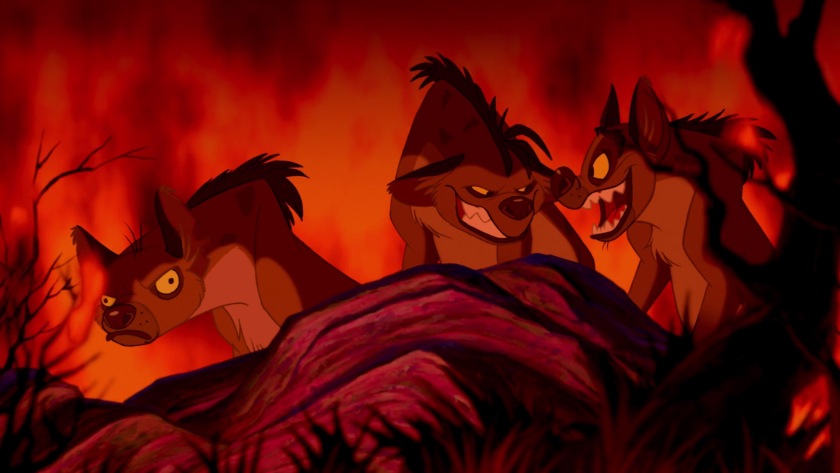
At first people’s textual evidence for this was that Shenzi and Banzai sound urban and ethnic while no one else does (but… Rafiki actually has an African accent), and that the hyenas are portrayed as hapless, fairly unintelligent dupes.
We can talk about casting decisions all day, but they don’t really mean much here. Ed is voiced by a white guy. And sure, Simba, adult Nala, and Scar are white, and so are three of the clowns (Zazu, Timon, and Puumba), but Mufasa, Sarabi, young Nala, and Rafiki are voiced by black actors.
The portrayal of the characters is more useful in figuring out the racial politics in this movie – if they exist. And we don’t really think they do.
TLK is about power. You may be tempted to see the struggle between lions and hyenas here to be a race metaphor but it really, really isn’t. The hyenas instead represent malcontents.
It’s a little bit confusing because among the many influences of TLK is a weirdo nature documentary about how lions and hyenas are nature’s enemies, which is not entirely true. Many a weirdo nature documentarian has depicted killing between the species, and attempted killing, and all sorts of things we’d rather not ever see, but as far as we can tell it really does boil down to this: predators are jerks. They’re highly strung. They kill sometimes without reasons because their kill switch is an actual kill switch. If you’ve lived with cats you know this. They just sort of snap.
So TLK ran with this sensationalist view of the two species and took the lions’ side (when lions are demonstrably the worst species ever) (we love lions but they really are awful).
Therefore, yes, there’s weird species-conflict that isn’t explained thoroughly. We don’t know the background of Mufasa’s hyena policies. Are hyenas only allowed in the Elephant Graveyard? Are we to assume that all they’re allowed to eat is then dead/dying elephants as some sort of utilitarian agreement between the species? We’ve always instead assumed that hyenas are allowed beyond the Pride Lands, but when they come near the Pride Lands they’re only allowed in the graveyard because Mufasa has carved out hyena-free zones.
There’s no way to know. We’re meant to take what we have for granted. We do know some other things, though.
The hyenas are unhappy with their lot. They don’t seem to be starving, but they do seem very willing to team up with shifty guys who bring them small amounts of food and promise to let them never go hungry again if elected. We read this as the hyenas being unhappy with their fair share. Maybe they do get all of the elephant meat in the Pride Lands and it’s just not enough for their little malcontent hearts.
How dare Mufasa regulate what they can and can’t hunt?
So when Scar promises that they can let loose, and they do, they immediately actually begin to starve, because Mufasa was doing the hard job of making them stick to his regulations, and they were able to eat. Now with Scar not doing any sort of work at all, EVERYONE is starving.
Banzai even says, “And I thought things were bad under que pasa.” Which admittedly is kind of stupid.
Shenzi tries to reason with Scar, and he doesn’t take their concerns seriously. And then, without resolving anything, he tells them to piss off. And then later blames Sarabi. And then declares that they’ll all just starve to death because he’s the king and he can do whatever he wants, and what he wants to do is nothing.
Tell us again how right all of the Disney villains are.
Ultimately, the hyenas are about the pitfalls of leadership. There will always be someone out there hating on the leader for making unpopular and necessary decisions, always. Because people are terrible and we need leaders. At least, according to this movie. And, like, all of human history.
Especially delicious about this metaphor? The hyenas kill Scar not because he made them starve through poor management, but because he tries to scapegoat them. Simba targets him as the mastermind behind Mufasa’s murder and the ruin of the Pride Lands, and Scar tries to pass off responsibility on to the hyenas because they’re hyenas and easy to mistrust.
And thus: a good leader is hated by the malcontents for unfounded reasons (so far as we can know), and a bad one gets eaten alive by them. For decent reasons. That’s a nice message, we suppose.
Lazy Opinion 5: The Lion King is a ripoff of Kimba the White Lion
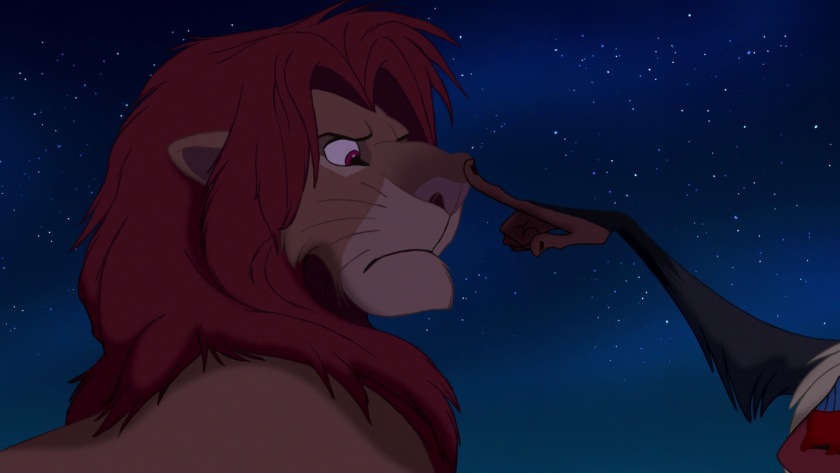
We haven’t seen Kimba, but we’ve seen the visual comparisons and the concept art of a white lion cub and the “quote” from “some Disney guy” about how TLK, still in production at the time, as a remake of sorts of Kimba. But let’s be real.
Even if we’re generous and assume that TLK was majorly, majorly influenced by Kimba, that doesn’t magically make it a ripoff.
Ripoff: When someone translates The Hobbit into another language and changes the character names to Harry, Ron, Hermione, Dumbledore, and Yaxley, and sells the book pretending that it’s the next book in the HP saga. THIS. IS. A. RIPOFF.
Sort of a Ripoff: When a “cheap knock-off” film company makes a cheap animated Snow Queen film and releases it around the same time that the Frozen DVD is on the shelves. This is only sort of a ripoff because there’s no legal issue here, but we still think of it as sleazy because they are trying to lazily cash in, and part of the business model seems to be tricking hapless people into buying their DVD instead of the Disney one, which is exploitative. But it’s not really a ripoff.
Not a Ripoff: Making a whole other movie with similar imagery and themes to an anime/manga you enjoyed.
That last is actually called “being influenced by something.” And while we may decide it’s a little ripoffy if Disney tries to distance itself from the similarities, particularly if we think they did in fact use it as an influence, it’s still not a ripoff.
This is the one JK Rowling used to get criticized with a lot because she’s only named three influences, and they don’t include Tolkein, and they also don’t include a host of less successful authors who have taken issue such as LeGuin, Card, and Yolen. Yawn.
Yes, it’d be nice if she acknowledged more influences, and this goes for TLK‘s creators, too, but they aren’t required to. Perhaps according to them those works aren’t influences – maybe they really can’t see the impact of them on their work. That happens and it isn’t a crime.
Also, there’s no real way of knowing that the TLK creators or JK Rowling actually did ever read/watch the things they’re being accused of being influenced by. In JKR’s case especially, where the authors themselves expressed varying degrees of petty dismay at not ever being acknowledged by her, it just seems really arrogant for them to have assumed that she must have read their stuff. Maybe she didn’t, guys. Probably she didn’t, in fact. None of you are as successful as she is. We hate to be cruel, but, they’re kind of asking for it, aren’t they? By saying, “She must have read me and used me as an influence and now she won’t even acknowledge it!” they just sort of come right out and add the real thing stuck in the craw: “I don’t get why she sells more books than me IT’S NOT FAIR.”
Kimba‘s creators weren’t that petty. Others on their behalf claimed TLK must have been influenced by it. Creators asked about this have all claimed they didn’t even know Kimba existed, which is likely true.
Also, “Simba” means “lion” in Swahili. In case you didn’t already know that.
Lazy Opinion 6: Alice in Wonderland is about drugs
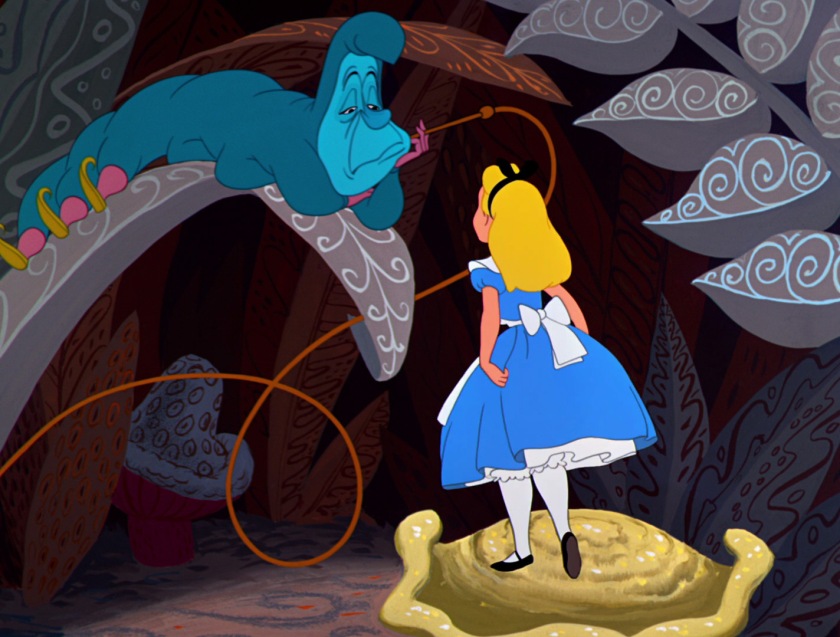
There are probably history-related reasons to refute this, such as drugs in the Victorian era not really being viewed the way we view them today. But that’s not interesting.
If you want to read drug experimentation into this movie and the book(s) it’s based on, that’s all well enough. There is textual evidence for that. Think “eat me” and “drink me.” However, we think it’s far more interesting to look at Alice not as a metaphor for a drug trip but actually as a little deliberation on what it’s like for children to live in an adult’s world.
“Eat me” and “drink me” fit in with this reading as well. Kids are physically smaller than adults and are compelled to eat and drink those nutritious things that will make them grow. In Wonderland, Alice grows and shrinks depending on what she’s eating or drinking, and how much.
Her confusion, being ordered around, and being outright ignored and deliberately misunderstood is really interesting in the “kid in the adult world” reading of it. Think also about how the movie is framed. It begins with Alice taking her lessons, which she’s not interested in, and it ends with her reciting that ridiculous poem the way the caterpillar demanded her to. Which version of this poem is right? We might say one makes more sense, or seems like something you might teach a Victorian-era child, but really it’s all arbitrary and nonsensical to get so upset if the girl can’t recite it the way you want her to.
The original version: “Against Idleness and Mischief,” by Isaac Watts
How doth the little busy bee
Improve each shining hour,
And gather honey all the day
From every opening flower!
How skilfully she builds her cell!
How neat she spreads the wax!
And labours hard to store it well
With the sweet food she makes.
In works of labour or of skill
I would be busy too:
For Satan finds some mischief still
For idle hands to do.
In books, or work, or healthful play
Let my first years be past,
That I may give for every day
Some good account at last.
That… is ridiculous. Let kids be kids, we say.
Lewis Carroll’s version:
How doth the little crocodile
Improve his shining tail
And pour the waters of the Nile
On every golden scale!
How cheerfully he seems to grin
How neatly spreads his claws
And welcomes little fishes in
With gently smiling jaws!
Heh heh heh. You know what, Lewis Carroll? You’re all right.
So if Alice seems out of sorts, confused, scared, and downright fed up while she has her adventures, it’s probably because she’s learning the hard lesson of childhood: adults are in charge and they. Are. Useless. And, you know, not – or maybe just less – because she’s high.
***To be continued! Because there’s lots more!
Also, we shall take a bit of a hiatus… we sort of have already, but now we’re writing horrible qualifying exams and trying to enjoy summer and as fun as it is to deliberate over media, we find ourselves needing to back off a bit for a bit.
See you soon!***




You ladies have all my “yes” for today. 🙂
Glad we could be of service 🙂
Amazing post! Agree with everything you’ve said. It’s interesting that male characters don’t get held up to the same standards as female characters. Aladdin and Flynn are thieves, Simba and Kristoff flee responsibility, Eric is just as quick to fall in love as Ariel is. Yet nobody accuses them of being bad role models.
Thanks! Yes, girls are held to an impossibly high standard. For some reason that is the default and easiest criticism to make about anything that is “for girls” or for kids at all – female agency is important, yes, but that doesn’t mean that EVERY girl character has to be an independent woman straight out of the womb.
Precisely. True equality will only exist when female characters can be as flawed as men. It’s why I love Frozen. Anna and Elsa are both allowed to make bad choices and our love for them never wavers.
This was the best thing I think I’ll read all week! The Disney hate clickbait drives me nutsies! I grew up on a steady diet of Disney princess, and I went on to be a science teacher who loves her hiking boots AND tiaras.
Bravo, ladies, bravo.
Thanks! We, too, grew up on Disney princesses and we feel that we turned out okay. Relatively. 😛
[…] of the most common lazy complaints about Disney is that the princesses are bad role models. We’ve said again and again that princesses […]